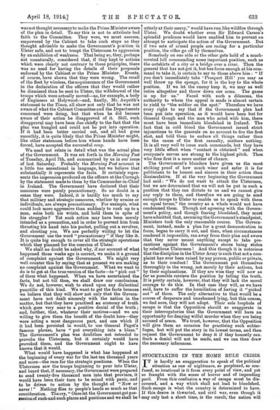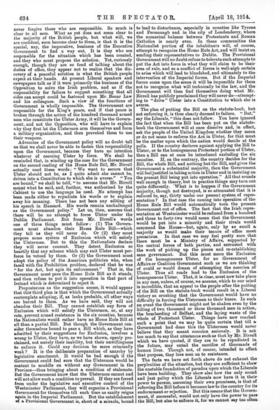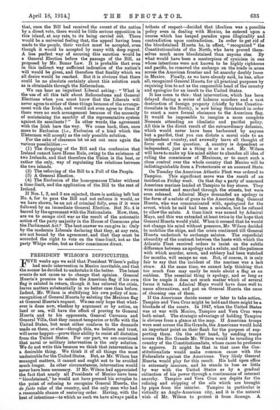STOCKTAKING IN THE HOME RULE CRISIS.
IT is hardly an exaggeration to speak of the political situation as one of nightmare, so perplexed, so con- fused, so irrational is it from every point of view, and yet so fraught with the sense of horror and of impending peril. From this confusion a way of escape must be dis- covered, and a way which shall not lead to bloodshed. Such escape is what the country is determined to have. If this desire is thwarted, and civil war, even though it may only last a short time, is the result; the nation will
never forgive those who are responsible. So much is clear to all men. What as yet does not seem clear to the majority of the British people, but what will, we are confident, soon become clear to them, is that it is the special, nay, the imperative, business of the Executive Government to find a way out. It is they who are responsible for the situation which has been created, and they who must propose the solution. Yet, curiously enough, though they are so fond of talking about the duties of office, they appear not to realize that the dis- covery of a peaceful solution is what the British people expect at their hands. At present Liberal speakers and newspapers talk as if it were primarily the business of the Opposition to solve the Irish problem, and as if the responsibility for failure to suggest something that all sides can accept could be fastened upon Mr. Bonar Law and his colleagues. Such a view of the functions of Government is wholly impossible. The Government are responsible for the King's peace, and if that peace is broken through the action of the hundred thousand armed men who constitute the Ulster Army, it will be the Govern- ment, and not the Opposition, who will have to explain why they first let the Ulstermen arm themselves and form a military organization, and then provoked them to use their weapons.
Advocates of the Government policy will no doubt tell us that we shall never be able to fasten this responsibility upon the Government, because they have no intention whatever of coercing Ulster by force. We shall be reminded that, in winding up the case for the Government on the second reading of the Home Rule Bill, Mr. Birrell actually used these words : " We want to secure that Ulster should not be, as I quite admit she cannot be, driven into a Constitution to which she is averse." " You are bound," we shall be told, " to assume that Mr. Birrell meant what he said, and, further, was authorized by the Cabinet to use the language he used. No attempt has been made either to repudiate his words or to explain away his meaning. There has not been any editing of his speech in Hansard. His words remain unchallenged as the Government policy." Let us, then, assume that there will be no attempt to force Ulster under the Dublin Parliament. But from Mr. Birrell'e words one of three things must follow : (1) The Govern- ment must abandon their Home Rule Bill—which they tell us they will never do. Or (2) they must propose some system of Exclusion which will satisfy the Ulstermen. But to this the Nationalists declare they will never consent. They detest Exclusion so heartily that any scheme which may snit Ulster must per- force be vetoed by them. Or (3) the Government must adopt the policy of the American politician who, when faced with the Prohibition problem, declared that he was " for the Act, but agin its enforcement." That is, the Government must pass the Home Rule Bill as it stands, and then refuse to put it into operation in that part of Ireland which is determined to reject it.
Preposterous as the suggestion seems, it would appear that thidAhird plan is that which the Government actually contemplate adopting, if, as looks probable, all other ways are barred to them. As we have said, they will not abandon their Bill. They cannot establish any form of Exclusion which will satisfy the Ulstermen, or, at any rate, prevent armed resistance in the six counties, because the Nationalists would rather have no Home Rule Bill at all than a partial Bill. But though the Government con- sider themselves bound to pass a Bill which, as they have admitted by their suggestions for Exclusion, involves a wrong to Ulster, they have, as we have shown, openly pro- claimed, not merely their inability, but their unwillingness to enforce it. Could any decision be more criminally weak ? It is the deliberate preparation of anarchy by legislative enactment. It would be bad enough if the. Government could feel sure that the Ulstermen would be content to muddle on without any Government in the Province—thus bringing about a condition of stalemate. But the Government know that the Ulstermen cannot and will not allow such a condition to prevail. If they are forced from under the legislative and executive control of the Westminster Parliament, they will organize a Provisional Government for themselves till such. time as sanity reigns again in the Imperial Parliament. But the establishment el a Provisional Government is, short of a miracle, bound to lead to disturbance, especially in counties like Tyrone and Fermanagh and in the city of Londonderry, where the numerical balance between Protestants and Roman Catholics is nearly even. In these communities the Nationalist portion of the inhabitants will, of course, attempt to recognize the Home Rule Act, and will insist on sending their representatives to Dublin. The Provisional Government will no doubt refuse to tolerate such attempts to put the Act into force in what they will claim to be their area of rule, and so a conflict of forces is well-nigh certain to arise which will lead to bloodshed, and ultimately to the intervention of the Imperial forces. But if the Imperial forces come upon the scene it will be impossible for them not to recognize what will technically be the law, and the Government will then find themselves doing what Mr. Birrell has publicly proclaimed they will never do—attempt- ing to " drive " Ulster into a Constitution to which she is
averse.
The plan of putting the Bill on the statute-book, but not enforcing it, is thus clearly doomed to failure. " But," say the Liberals," this does not follow. You have ignored the fact that when the Bill has been put on the statute- book the Government will at once dissolve and, in effect, ask the people of the United Kingdom whether they mean or do not mean to enforce the Act in Ulster, for that must be the matter upon which the nation would decide at the polls. If the country declares against applying the Bill to Ulster, or to the homogeneous Protestant portion of Ulster, then a Bill can at once be introduced excluding the six counties. If, on the contrary, the country decides for the Bill, the whole Bill, and nothing but the Bill, and gives the Government a substantial majority, then the Government will feel justified in taking action in Ulster and in insisting on the present Bill being put into operation." All that sounds well enough in theory, but in practice things may turn out quite differently. 'What is to happen if the Government majority, though not destroyed, is so attenuated that it is reduced to, say, thirty under our present system of repre- sentation? In that case the coming into operation of the Home Rule Bill would automatically turn the present Government out of office. The fact that the Irish repre- sentation at Westminster would be reduced from a hundred and three to forty-two would mean that the Government would be put into a minority and their rivals would command the House—but, again, only by so small a, majority as would make their tenure of - office most precarious. In that case we may feel pretty sure that there must be a Ministry of Affairs, supported by the central forces of both parties, and entrusted with the work of picking up the pieces and re-establishing sane government,. But this must mean the Exclusion of the homogeneous Ulster, for no Government of Affairs or Coalition Government such as we are thinking of could or would dream of attempting the coercion of Ulster. Thus all roads lead to the Exclusion of the homogeneous Ulster. That, it is clear, must now take place in any case, unless, of course, we assume, which to our mind is incredible, that an appeal to the people after the putting of the Bill on the statute-book would result in a Liberal victory so crushing that the Government would have no difficulty in forcing the Ulstermen to their knees. In such an event the Government might not be shaken even by the killing of two thousand or three thousand men in action, the bombarding of Belfast, and the laying waste of the whole of Protestant Ulster. Things have now reached such a point that we may be quite certain that till a Government bad done this the Ulstermen would never believe that they meant coercion seriously. It is not too much to say that utterances such as that by Mr. Birrell which we have quoted, if they are to be repudiated in the future, may entail the sacrifice of thousands of human lives. Though not, of course, intended to effect that purpose, they lure men on to resistance. The facts we have set forth above do not exhaust the perplexities of the situation, but they are sufficient to show the unstable foundation of paradox upon which the Liberals have been building. They show also how the only sound and just policy which the Liberals now have it in their power to pursue, assuming their own premisses, is that of referring the Bill before it becomes law to the country for its endorsement or rejection. But this means that the Govern- ment, if successful, would not only have the power to pass the Bill, but alto to enforce it, for we cannot say too often that, once the Bill had received the assent of the nation by a direct vote, there would be little serious opposition in this island, at any rate, to its being carried out. There would be a universal feeling that, the appeal having been made to the people, their verdict must be accepted, even though it would be accepted by many with deep regret. A less perfect way of securing this sanction would be a General Election before the passage of the Bill, as proposed by Mr. Bonar Law. It is probable that even in this indirect way sufficient indication of the nation's will would be given, and therefore that finality which we all desire would be reached. But it is obvious that there could be no absolute certainty about this solution such as is obtainable through the Referendum.
We can hear an impatient Liberal asking : " What is the use of all this talk about Referendums and General Elections when you must know that the Liberals will never agree to either of these things because of the arrange- ment with the Irish, and would not even agree to them if there were no such arrangement because of the necessity of maintaining the sanctity of the representative system against its assailants ? " In other words, the agreement with the Irish bars the way. We come back, then, once more to Exclusion (i.e., Exclusion of a kind which the Ulstermen will accept) as the only possible solution.
For the sake of clearness let us set out once again the various possibilities (1) The dropping of the Bill and the confession that Ireland cannot have Home Rule, owing to the existence of two Irelands, and that therefore the Union is the best, or rather the only, way of regulating the relations between the two islands.
(2) The referring of the Bill to a Poll of the People. (3) A General Election.
(4) The Exclusion of the homogeneous Ulster without a time-limit, and the application of the Bill to the rest of Ireland.
If Nos.1, 2, and 3 are rejected, there is nothing left but No. 4, for to pass the Bill and not enforce it would, as we have shown, be an act of criminal folly, even if it were followed by an immediate General Election. But No. 4 is barred by the agreement with the Nationalists. How, then, are we to escape civil war as the result of the automatic action of the party majority in the House of Commons plus the Parliament Act? The best answer we can give is: Only by the moderate Liberals declaring that they, at any rate, are not bound by the agreement, and that they must be accorded the right to vote on the time-limit, not as the party Whips order, but as their consciences direct.












































 Previous page
Previous page